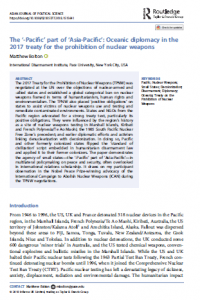 Director of the International Disarmament Institute Matthew Bolton has published an article in the Asian Journal of Political Science analyzing the role of Pacific states in the negotiations of the 2017 Treaty on the Prohibition of Nuclear Weapons:
Director of the International Disarmament Institute Matthew Bolton has published an article in the Asian Journal of Political Science analyzing the role of Pacific states in the negotiations of the 2017 Treaty on the Prohibition of Nuclear Weapons:
The 2017 Treaty for the Prohibition of Nuclear Weapons (TPNW) was negotiated at the UN over the objections of nuclear-armed and -allied states and established a global categorical ban on nuclear weapons framed in terms of humanitarianism, human rights and environmentalism. The TPNW also placed ‘positive obligations’ on states to assist victims of nuclear weapons use and testing and remediate contaminated environments. States and NGOs from the Pacific region advocated for a strong treaty text, particularly its positive obligations. They were influenced by the region’s history as a site of nuclear weapons testing in Marshall Islands, Kiribati and French Polynesia/Te Ao Maohi; the 1985 South Pacific Nuclear Free Zone’s precedent; and earlier diplomatic efforts and activism linking denuclearization with decolonization. In doing so, Pacific and other formerly colonized states flipped the ‘standard of civilization’ script embedded in humanitarian disarmament law and applied it to their former colonizers. The paper demonstrates the agency of small states—the ‘-Pacific’ part of ‘Asia-Pacific’—in multilateral policymaking on peace and security, often overlooked in international relations scholarship. It draws on my participant observation in the Nobel Peace Prize-winning advocacy of the International Campaign to Abolish Nuclear Weapons (ICAN) during the TPNW negotiations.
